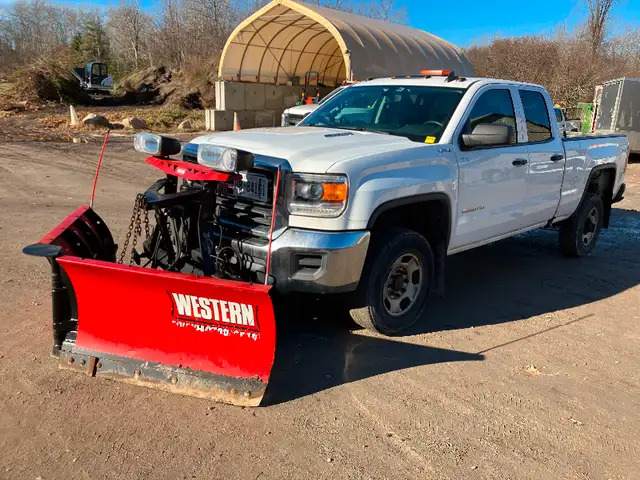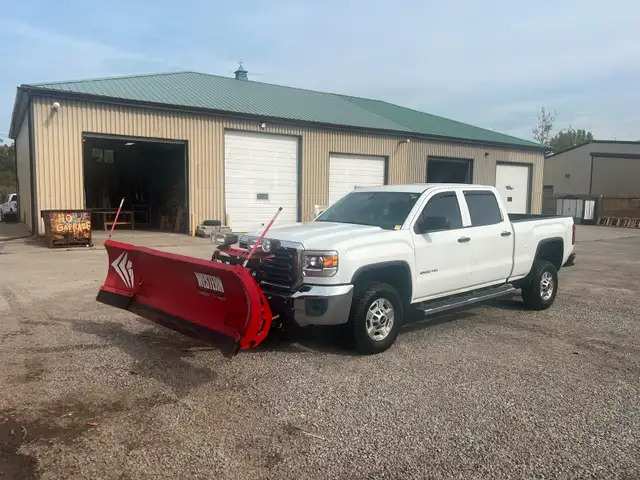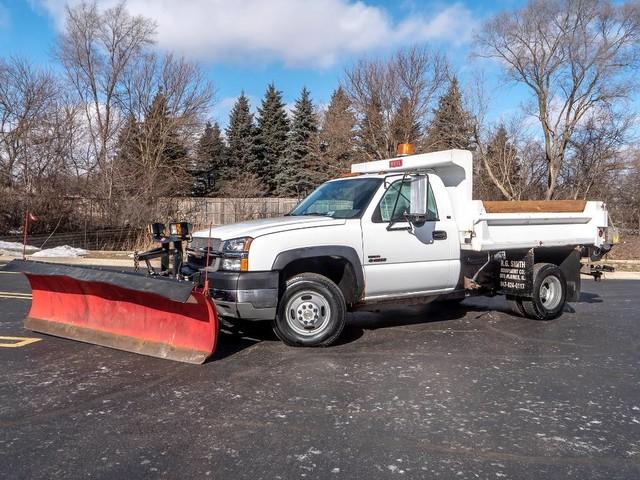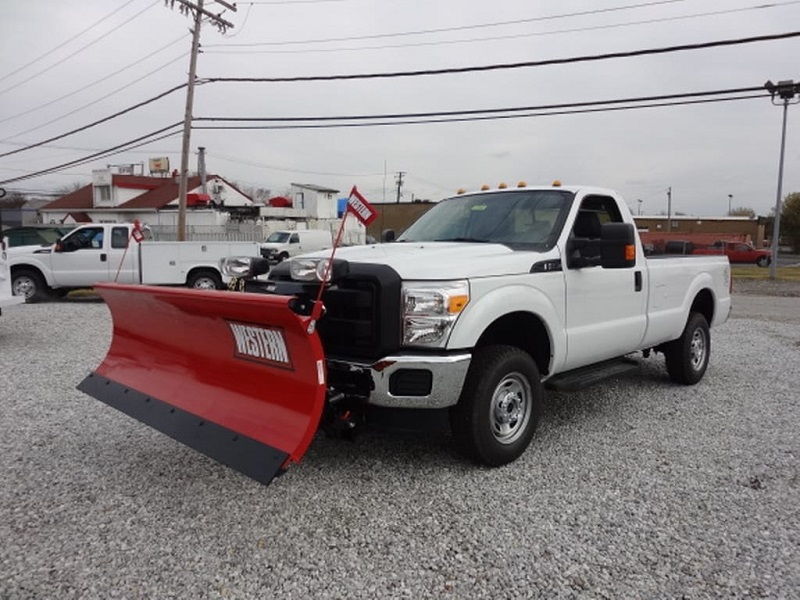Pickup Plow Trucks For Sale: Your Comprehensive Guide to Conquering Winter pickup.truckstrend.com
As winter approaches, bringing with it the promise of snow, many individuals and businesses begin to contemplate their snow removal strategy. For those seeking a robust, reliable, and versatile solution, a pickup plow truck stands out as an indispensable asset. Far more than just a vehicle, a pickup plow truck is a dedicated snow-fighting machine, designed to clear driveways, parking lots, and access roads efficiently and effectively. Whether you’re a commercial landscaper looking to expand your services, a property manager needing to maintain clear premises, or a homeowner with a sprawling driveway, investing in the right pickup plow truck can transform winter challenges into manageable tasks, or even profitable opportunities.
This comprehensive guide will delve into everything you need to know when considering pickup plow trucks for sale, from understanding their components and types to navigating the buying process, ensuring you make an informed decision that will serve you well through countless snowfalls.
Pickup Plow Trucks For Sale: Your Comprehensive Guide to Conquering Winter
Why Invest in a Pickup Plow Truck? Benefits & Applications
The decision to purchase a pickup plow truck is often driven by a combination of practical needs and economic considerations. Here’s why they are such a valuable investment:
- Commercial Profitability: For businesses like landscaping, property management, or general contracting, offering snow removal services can significantly boost off-season revenue. A dedicated plow truck allows you to bid on commercial contracts, service multiple properties, and provide a vital service during peak demand.
- Residential Self-Sufficiency: Homeowners with large or long driveways, or those living in areas with heavy snowfall, can save considerable money and time by plowing their own property. No more waiting for contractors or struggling with snow blowers for hours.
- Versatility Beyond Winter: Unlike specialized snow removal equipment, a pickup truck retains its utility year-round. It can haul materials, tow trailers, transport equipment, and serve as a daily driver once the snow melts, maximizing your investment.
- Cost-Effectiveness: While the initial outlay can be significant, owning your own plow truck can be more cost-effective in the long run compared to continually hiring snow removal services, especially for large properties or frequent snow events.
- Immediate Response: When a snowstorm hits, you have the power to clear your property or fulfill commercial obligations immediately, without relying on external schedules or availability.

Key Components of a Pickup Plow Truck
Understanding the anatomy of a pickup plow truck is crucial for making an informed purchase. It’s more than just a truck with a blade; it’s an integrated system.
1. The Truck Itself
The foundation of any good plow truck is a robust pickup. Key considerations include:

- 4×4 Capability: Absolutely essential for traction in snowy, icy conditions and for pushing heavy snow.
- Heavy-Duty Suspension: Plowing puts immense stress on the front suspension. Look for trucks with upgraded suspension components, or at least a strong factory setup designed for heavy loads.
- Engine & Transmission:
- Gas vs. Diesel: Diesel engines offer superior torque, durability, and often better fuel economy under heavy load, making them ideal for commercial plowing. However, they typically have higher upfront costs and maintenance. Gas engines are less expensive initially and easier to maintain, suitable for lighter, residential use.
- Transmission: Automatic transmissions are generally preferred for plowing due to ease of operation, but ensure it’s a heavy-duty unit designed for towing/hauling to withstand the constant shifting and strain.

- GVWR (Gross Vehicle Weight Rating): This is the maximum permissible weight of the vehicle, including the vehicle itself, its passengers, cargo, and the plow system. It’s critical to ensure the combined weight of your truck, plow, ballast (if needed), and anything else in the truck does not exceed the GVWR.
- Frame & Chassis: A strong, full-boxed frame is paramount for durability under plowing stresses.
2. The Plow System
The blade and its hydraulic system are the heart of the snow removal operation.
- Blade Type:
- Straight Blades: The most common and economical, good for general pushing.
- V-Plows: Offer excellent cutting power, can break through drifts, and can be angled for efficient windrowing. More expensive and complex.
- Winged Plows: Straight blades with hydraulic wings that extend to carry more snow, ideal for wide passes and commercial lots.
- Push-Box Plows: Large, box-shaped attachments designed to scoop and carry massive amounts of snow, ideal for large parking lots.
- Mounting System:
- Front Mount: The most common, quick-attach/detach systems.
- Under-Frame Mount: Distributes weight more evenly, reducing stress on the front end, but can reduce ground clearance.
- Hydraulics & Controls: A reliable hydraulic system is crucial for lifting, lowering, and angling the blade. Ensure the controls (in-cab joystick or buttons) are ergonomic and responsive.
3. Supporting Equipment
Don’t overlook these vital accessories:
- Plow Lights: Essential for visibility, as the plow often obstructs the truck’s headlights.
- Warning Beacons/Strobe Lights: Increase visibility, especially important for commercial operations on public roads.
- Salt Spreaders/Sanders: Mounted in the truck bed, these distribute salt or sand for de-icing, significantly enhancing effectiveness.
- Ballast: Weight (e.g., sandbags, concrete blocks) placed in the truck bed over the rear axle to improve traction and balance the front-heavy plow.
- Heavy-Duty Battery/Alternator: Plowing operations, especially with added lights and spreaders, demand a lot of electrical power.
Types of Pickup Plow Trucks & Plows
Pickup trucks are categorized by their payload capacity, which directly influences the size and type of plow they can handle.
- Light-Duty Pickups (Half-Ton: F-150, Silverado 1500, Ram 1500):
- Plow Size: Typically limited to lighter, smaller straight plows (6.5-7.5 ft).
- Application: Best suited for residential driveways or very light commercial use.
- Considerations: Front-end components may wear faster; requires careful weight management.
- Medium-Duty Pickups (Three-Quarter Ton: F-250, Silverado 2500, Ram 2500):
- Plow Size: Can handle a wide range of straight, V-plows, and smaller winged plows (7.5-9 ft).
- Application: The most popular choice for commercial snow removal due to their balance of capability and maneuverability.
- Considerations: Often come with heavy-duty suspension and braking systems.
- Heavy-Duty Pickups (One-Ton: F-350, Silverado 3500, Ram 3500, Dually options):
- Plow Size: Capable of handling the largest straight, V-plows, and winged plows (9-10+ ft), as well as push-box plows.
- Application: Ideal for large commercial lots, industrial complexes, and areas with extremely heavy snowfall.
- Considerations: Offer maximum payload and towing capacity; dually rear wheels provide superior stability and traction for very heavy loads.
Important Considerations When Buying
The decision to purchase a pickup plow truck involves several critical factors that will impact its performance, longevity, and your overall satisfaction.
- New vs. Used:
- New: Offers warranty, latest technology, no immediate maintenance concerns. Higher initial cost.
- Used: Significantly lower cost, but requires thorough inspection. Potential for hidden issues, no warranty. A well-maintained used truck can be an excellent value.
- Budget: Establish a realistic budget that includes not just the truck and plow, but also potential immediate repairs, registration, insurance, and ongoing maintenance. Remember, a cheaper upfront price might mean more expensive repairs later.
- Truck Condition:
- Frame Rust: Critical. Plowing puts immense stress on the frame. Inspect thoroughly for excessive rust, especially where the plow mounts.
- Engine & Transmission: Check for leaks, strange noises, smooth shifting. Ask for service records.
- Suspension & Brakes: Look for worn bushings, shocks, springs. Ensure brakes are strong.
- Tires: Good quality, aggressive tread tires (all-terrain or winter) are essential.
- Plow Condition:
- Blade Wear: Check the cutting edge for excessive wear.
- Hydraulics: Inspect hoses for cracks, leaks. Test lift, lower, and angle functions multiple times. Listen for pump noise.
- Wiring: Ensure all lights and controls work correctly.
- Rust: Check the plow frame for structural rust.
- Payload Capacity & GVWR Match: This cannot be stressed enough. Ensure the truck’s GVWR can safely accommodate the weight of the plow, ballast, driver, passengers, and any other equipment. Overloading can lead to premature wear, safety hazards, and even fines.
- Maintenance History: A well-documented service history for both the truck and the plow system is a huge plus, indicating a responsible owner.
- Local Climate & Snowfall: Consider the typical snowfall in your area. A small residential plow might suffice for occasional light snow, but heavy, frequent snows demand a more robust setup.
- Legal Requirements: Be aware of any local or state regulations regarding plow truck operation, including lighting, weight limits, and insurance requirements. Commercial operations may need specific licensing.
Where to Find Pickup Plow Trucks For Sale
The market for pickup plow trucks is diverse, offering several avenues for potential buyers:
- Dealerships (New & Used):
- New Truck Dealerships: Offer brand-new trucks and can often package them with new plow systems.
- Used Car Dealerships: May have used plow-ready trucks, often with warranties or certified pre-owned options.
- Specialized Equipment Dealers: Many dealers specialize in commercial truck equipment, including snow plows. They often sell complete plow truck packages or can install new plows on your chosen truck.
- Online Marketplaces:
- Craigslist, Facebook Marketplace: Great for finding private sellers, often offering good deals, but require more caution and due diligence.
- eBay Motors, Autotrader, Cars.com: Larger platforms with more inventory from both private sellers and dealerships.
- Auctions: Government surplus auctions, commercial liquidation auctions, or specialized vehicle auctions can be sources for used plow trucks, often at competitive prices, but usually "as-is" with no guarantees.
- Local Classifieds & Word of Mouth: Sometimes the best deals are found locally from contractors upgrading their fleet or homeowners selling their old setup.
Tips for Inspection and Purchase
Once you’ve identified potential candidates, follow these steps to ensure a smart purchase:
- Thorough Visual Inspection: Walk around the truck and plow multiple times. Look for rust, body damage, tire condition, and any obvious fluid leaks.
- Test Drive (Crucial!): Drive the truck both with and without the plow attached (if possible). Listen for engine and transmission noises. Test brakes, steering, and 4×4 engagement. Pay attention to how it handles the weight of the plow.
- Test Plow Functionality: If the plow is attached, cycle it through all its functions (raise, lower, angle left/right, V-plow positions). Check that all lights on the plow work.
- Review Service Records: Ask for any maintenance or repair history. This provides insight into how well the truck and plow have been cared for.
- Pre-Purchase Inspection (Highly Recommended): If you’re serious about a vehicle, especially a used one, invest in having a trusted mechanic (ideally one familiar with plow trucks) perform a comprehensive inspection. They can identify issues you might miss.
- Negotiate: Don’t be afraid to negotiate the price. Research comparable sales to understand the market value.
Price Guide: Estimated Costs for Pickup Plow Trucks For Sale
The price of a pickup plow truck can vary dramatically based on the truck’s age, make, model, condition, mileage, and the type and condition of the plow system. The table below provides estimated ranges to help you budget. These figures are subject to change based on market conditions, location, and specific features.
| Category | Truck Type | Plow Type/Capacity | Estimated Price Range (USD) | Key Inclusions/Notes |
|---|---|---|---|---|
| Used – Light Duty | Half-Ton (e.g., F-150, Silverado 1500) | Small Straight (6.5-7.5 ft) | $8,000 – $25,000 | Older models, higher mileage. May require immediate maintenance. Often sold as a package. |
| Used – Medium Duty | Three-Quarter Ton (e.g., F-250, Ram 2500) | Straight, V-Plow (7.5-9 ft) | $20,000 – $50,000 | More common for commercial. Varies greatly by year and condition. Expect a range of ages and mileages. |
| Used – Heavy Duty | One-Ton (e.g., F-350, Sierra 3500) | Large V-Plow, Winged, Push-Box | $30,000 – $70,000+ | For serious commercial use. May include spreaders. Condition is key. |
| New Plow System Only | (No Truck Included) | Straight Plow (7.5-9 ft) | $4,500 – $8,000 | Price for the plow blade, frame, hydraulics, and controls. Installation extra. |
| New Plow System Only | (No Truck Included) | V-Plow, Winged Plow (8-10 ft) | $6,500 – $12,000+ | More advanced systems with additional features. Installation extra. |
| New Truck + New Plow | Half-Ton | Small Straight | $55,000 – $75,000+ | Base model truck with basic plow. Warranty on both. |
| New Truck + New Plow | Three-Quarter Ton | Straight, V-Plow | $70,000 – $100,000+ | Popular commercial setup. Includes more robust truck and plow. |
| New Truck + New Plow | One-Ton (Heavy Duty) | Large V-Plow, Winged | $80,000 – $120,000+ | Top-tier commercial setup. May include spreaders and other accessories. |
| Additional Equipment | Salt Spreader/Sander | (Varies by capacity/type) | $1,000 – $10,000+ | Hopper or tailgate spreaders. Varies by size and features (e.g., electric vs. hydraulic). |
| Annual Maintenance/Running | (Fuel, repairs, insurance) | (Per season) | $500 – $3,000+ | Highly variable based on usage, condition, and commercial insurance needs. Does not include initial purchase. |
Note: Prices are estimates and can fluctuate significantly based on geographic location, specific dealer promotions, market demand, and the exact specifications and condition of the truck and plow.
Frequently Asked Questions (FAQ)
Q1: What’s the best truck for plowing?
A1: The "best" truck depends on your needs. For most commercial operations, a 3/4-ton pickup (e.g., Ford F-250, Ram 2500, Chevy Silverado 2500HD) is the most common and versatile choice. For heavier work, a 1-ton (F-350, Ram 3500, Silverado 3500HD) is better. For light residential use, a 1/2-ton can suffice with a smaller plow.
Q2: Can I put a plow on any pickup truck?
A2: No. While many pickups can accommodate a plow, it’s crucial to check the truck’s Gross Vehicle Weight Rating (GVWR) and the manufacturer’s recommendations for plowing. Many light-duty trucks are not designed to handle the weight and stress of a plow, which can lead to premature wear or safety issues.
Q3: What kind of maintenance does a plow truck need?
A3: Beyond regular truck maintenance, plow trucks require specific attention:
- Pre-season: Inspect hydraulics (hoses, fluid, pump), electrical connections, lights, cutting edge, and mounting hardware.
- During season: Daily checks for fluid leaks, loose bolts, and proper operation.
- Post-season: Clean and grease all pivot points, drain hydraulic fluid (if recommended by manufacturer), store plow properly (indoors or covered). Rust prevention is key.
Q4: How much does a plow system alone cost?
A4: A new, complete plow system (blade, frame, hydraulics, controls) for a pickup typically ranges from $4,500 to $12,000+, depending on the type (straight, V-plow, winged) and brand. Installation costs are usually extra, ranging from $500 to $1,500.
Q5: Is diesel better than gas for plowing?
A5: For heavy-duty, commercial plowing, diesel engines are often preferred due to their superior low-end torque, better fuel economy under load, and longer lifespan. However, they have higher upfront costs, more complex emissions systems, and more expensive maintenance. Gas engines are suitable for lighter, intermittent use.
Q6: What is GVWR and why is it important for a plow truck?
A6: GVWR (Gross Vehicle Weight Rating) is the maximum total weight of a vehicle, including its own weight, fuel, passengers, cargo, and any attached equipment (like a plow). It’s critical because overloading a truck can compromise steering, braking, and stability, leading to safety hazards and accelerated wear on components. Always ensure your loaded plow truck stays within its GVWR.
Q7: Do I need special insurance for a plow truck?
A7: For commercial plowing, absolutely. Standard personal auto insurance will not cover commercial activities. You’ll need commercial auto insurance, which may include liability coverage for property damage or injury caused by your plowing operations. Even for personal use, inform your insurer that you’re attaching a plow, as it changes the vehicle’s dynamics and value.
Conclusion
Acquiring a pickup plow truck is a significant investment that promises to make winter more manageable, and potentially more profitable. By understanding the core components, considering the various types of trucks and plows available, and diligently evaluating potential purchases, you can secure a reliable workhorse that will serve you for many seasons to come. Remember to prioritize the truck’s condition, especially its frame and powertrain, and ensure the plow system is in good working order. With careful planning and a thorough inspection process, you’ll be well-equipped to tackle whatever winter throws your way, transforming daunting snowfalls into clear paths and successful operations.
